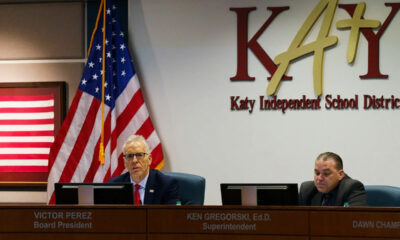Texas
A push to remove LGBTQ-themed books in a Texas county could signal rising partisanship on school boards
Hood County’s refusal to remove two books from the children’s section of the library sparked a yearslong political battle. Now school board races have taken on a deeply partisan tone, and elections serve as a purity test for far-right politics.

This article originally appeared in The Texas Tribune
 Nearly seven years ago, Melanie Graft’s 4-year-old daughter was in the children’s section of her local North Texas library when she picked up a book about an LGBTQ pride parade. Within the colorful pages of the book, “This Day in June,” children and adults celebrate with rainbow flags and signs promoting equality and love over hate. Adults embrace and kiss one another.
Nearly seven years ago, Melanie Graft’s 4-year-old daughter was in the children’s section of her local North Texas library when she picked up a book about an LGBTQ pride parade. Within the colorful pages of the book, “This Day in June,” children and adults celebrate with rainbow flags and signs promoting equality and love over hate. Adults embrace and kiss one another.
Alarmed, Graft launched a campaign against the book and another about a boy who likes to wear dresses, suggesting that their presence in the library foisted inappropriate themes on unsuspecting children. By June 2015, the Hood County Library Advisory Board had received more than 50 complaints asking that the two books be removed from the shelves of the children’s section. The board refused, saying the books did not promote homosexuality, as some complaints had suggested, and arguing that the library already required parents of young children to accompany them and check out materials. Librarian Courtney Kincaid called “This Day in June” a tool to teach respect and acceptance of the LGBTQ community, but she agreed to move it to the adult section. She kept “My Princess Boy” in the children’s section.
Opponents of the books then turned to the entirely Republican Hood County Commissioners Court, which appoints members to the library advisory board. After an emotional three-hour meeting that July, commissioners declined to remove the books on the advice of the county’s attorney, who concluded that such action could spur a lawsuit over unlawful censorship because of potential violations of state law and the U.S. Constitution.
Anger over that decision helped fuel a seven-year effort by far-right Christian conservatives in Hood County to seize control of elected offices and government boards from more traditional Republicans. They won spots on the commissioners court, grabbed seats on the library advisory board and, last year, launched a monthslong campaign to oust Michele Carew, the county’s independent elections administrator, accusing the Republican of harboring a secret liberal agenda.
In November, the group claimed a major victory after Graft won a seat on the school board in Granbury, the county seat. Also elected was Courtney Gore, the co-host of a local far-right internet talk show who has railed against masks and vaccines and promoted Donald Trump’s false claim that the 2020 presidential election was stolen. On the campaign trail, the women promised to comb through educational materials for any signs of “indoctrination” in the form of books or lesson plans that they charged promote LGBTQ ideology or what they referred to as critical race theory, a university-level academic discipline based on the idea that racism is embedded in U.S. legal and other structures.
“When my daughter was 4 years old, my parental rights were taken away here at the public library in Hood County,” Graft, who said on the campaign trail that her school-age children did not attend Granbury public schools, told attendees at a GOP forum before the election. “I stood up for my daughter then, and I’ll stick up for our kids now.”
The yearslong journey in Hood County offers a window into the fiercely contentious debates over curriculum and library books that have cropped up across the state and country in recent months. Once-nonpartisan school board races are taking on a decidedly partisan tone, and administrators are now sounding like political operatives.
Peter Coyl, a librarian who testified on behalf of the American Library Association in 2015 against removing the books, recalls thinking at the time that Hood County was an outlier because of how extensively the fight consumed the community. In retrospect, Coyl said, Hood County foreshadowed the larger battle that is playing out in school board races and over library books across the country.
“It was obvious that there was a portion of the community that was not happy with the outcome,” said Coyl, who now leads a library in Sacramento, California. “But I think now we are in an era, a time where people aren’t willing to have discourse or conversations about things. They want their way and they want to impose their view on anyone and everyone because they feel that they’re right.”
The Granbury Independent School District elections last fall served as a litmus test of loyalty to the GOP’s most conservative wing, which pushed candidates for nonpartisan posts to declare their party affiliation and to explain how they would actively push far-right initiatives.

“This was the first election where candidates felt the need to put ‘conservative’ or ‘Republican’ on their campaign signs and in their literature that they sent out,” said Nancy Alana, a self-described conservative Republican who lost to Gore in November after serving on the school board since 2009. “And I have always shied away from that because I understood that the school board position was nonpolitical. And that was what I was trying to uphold.”
A career educator who spent 30 years as a teacher and principal, Alana shares views similar to those of Graft and Gore on books and curriculum, but was pegged by some far-right Republican activists as too passive for their vision of a more uncompromising “new Granbury.” Alana said she worried that the focus on culture-war battles over books and curriculum could distract leaders from important issues like overcrowding in the growing district.
Graft did not respond to requests for comment. Gore said in an email to ProPublica and The Texas Tribune that declaring party affiliation makes school board elections more transparent. She said that the board “more accurately reflects the population now.”
“Any entity that taxes or oversees school curriculum is inherently partisan, whether people want to admit it or not,” Gore said. “I proudly ran as a Conservative Republican and will never apologize for being one.”
Challenges to books about sexual orientation and racial identity in Texas are the latest in a wave of divisive national political issues driving local campaigns. In October, Matt Krause, a Republican state representative from Fort Worth who was then running for attorney general, sparked national attention when he released a list of 850 books that he said should be investigated and potentially banned from school libraries. The majority of the titles dealt with LGBTQ themes, and some were targeted for merely including LGBTQ characters, according to an analysis by BookRiot.
Gov. Greg Abbott, facing a Republican primary challenge from two opponents running to his right on education issues, later ordered the Texas Education Agency to investigate the availability of “pornography” in public schools, a term that some politicians and district leaders have interpreted as a catchall for books on sexuality and sexual orientation. He urged criminal prosecutions under the state penal code of educators who make such material available.
At a January school board meeting, Granbury Superintendent Jeremy Glenn, who is appointed by the board, referenced Krause and Abbott in defense of the district’s recent decision to remove more than 130 books that deal with race and sexual orientation from school libraries, pending a review.
The Granbury school board went a step further during its meeting Jan. 24. Led by Graft, the school board cleared the way for the district to strip any material deemed vulgar or unsuitable by administration and the board from its shelves without a committee review.
The next night, at Brazos Covenant Ministries church, Glenn assured attendees at a Republican Party gathering that school board members would act as gatekeepers against books and “woke” curriculum about sexual orientation and racial identity.
Speaking in partisan political language not common among school superintendents, Glenn pointed to decreasing margins of victory for Republican presidential candidates in the state, and warned local party leaders that “there are individuals out there that want to destroy what you believe.”
“They don’t believe in the same America that you and I grew up in, and that’s just the truth,” he said. “Our community has to decide whether or not we want to hold the line.”

An old fight resurfaces
A week after the November election, Emily Schigut, a fifth grade reading teacher and soccer coach, put her house on the market. She knew it was time to leave her job.
Schigut, who has family in Hood County, was teaching in Midland five years ago when the principal of STEAM Academy at Mambrino in Granbury reached out to her about an opening at its campus.
She recalls her excitement at coming to the district, which she said was a model of innovation. Now she worries that politics have taken hold in a way that makes it difficult for teachers to do their jobs. And as someone who identifies as queer, she is concerned about the message the district is sending to educators and students.
“It’s absolutely terrifying,” Schigut said in an interview. “All anyone has to do is listen to the words they’ve said. They aren’t there for the kids. They are there for a political agenda. You watch all these things happening around the country, and in the blink of an eye, it was happening here.
“It’s very sad because I 100% believed in this district. But I do not feel safe here any longer.”
While the shift in tone at the school district felt sudden to Schigut, far-right Republicans had spent years working toward electing candidates to local political offices. Their efforts gained steam in the summer of 2015 amid outrage over two failed fights: one over the LGBTQ books and another when Hood County was required to comply with the U.S. Supreme Court’s landmark decision legalizing same-sex marriage. County Clerk Katie Lang initially refused to issue a marriage license to a gay couple.
Despite losing the debate over books, opponents claimed a major victory that year when Kincaid, Granbury’s librarian, resigned. She said she could no longer endure harassment and bullying by the group, which she recalled had posted someone at the library’s circulation desk every day to watch her.
“Even going out to lunch was a gamble because I didn’t know if my food would be tainted in any way by someone who disagreed with my decision to keep the books. Whenever I would leave the library, be it during my lunch time or running an errand for work, I was followed,” Kincaid told the American Library Association in 2017 after her resignation. Kincaid, who faced additional harassment following her departure from Hood County, declined an interview.
Graft became increasingly active in local politics, serving on the local library advisory board and as a Republican Party precinct chair. Her fight against the books made her popular in far-right circles, giving her a platform across the state.
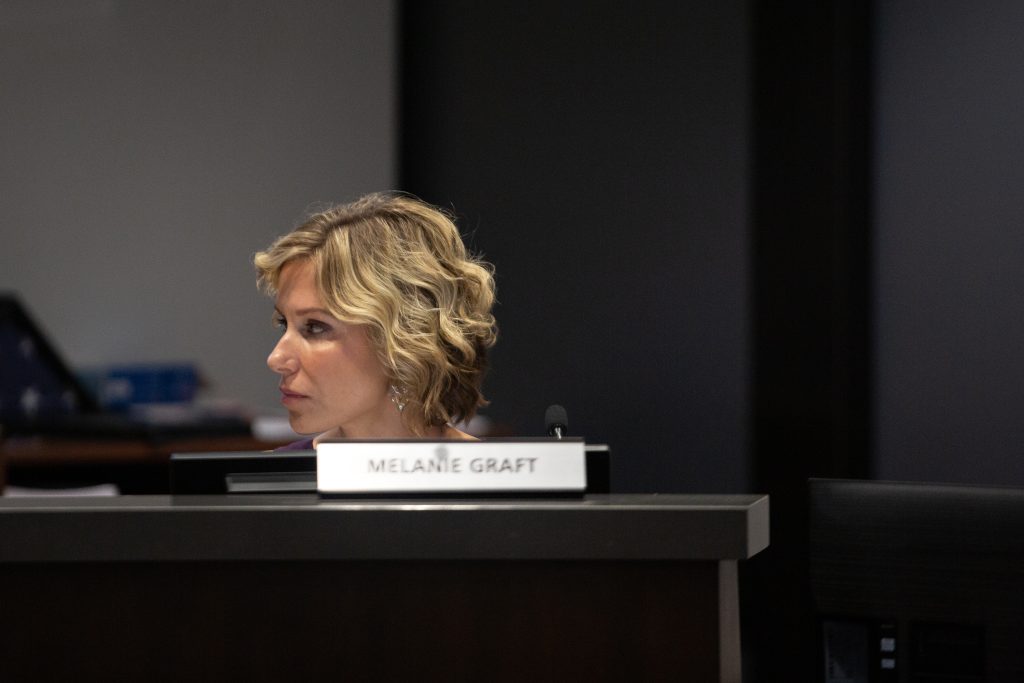
During an interview with Doc Greene, a self-described conservative activist radio show host, at the 2016 state Republican convention in Dallas, Graft described the moment her daughter encountered “This Day in June” by Gayle Pitman.
“She picked it up, turned to the page and showed it to me, and I was appalled,” Graft said. “There were political issues. Signs like love over hate, equal rights, things that a child certainly can’t understand. And this book on the back binding was recommended for children ages 4 to 8.”
She continued, “They have an agenda and an indoctrination for our children. It’s not enough to tolerate. They want us to participate. And they want our children.”
After Graft had finished, Greene said he was not a violent man, then added, “But something like this enrages me to such a degree that violence is not completely ruled out. Because when you go after the children, this is not the time to just stand by and talk about it.”
Graft responded that she was not a proponent of violence, but Greene continued pressing.
“If you’re not willing to kill for what you believe, you’ve already lost the war. Our children are worth saving,” said Greene, who did not respond to requests for comment.
“I can’t argue with that,” Graft said. “I agree.”
A month later, the Northeast Tarrant Tea Party near the library where Kincaid had relocated uploaded a video of Graft speaking at one of its meetings to YouTube.
“This is Courtney Kincaid. You need to know her name,” Graft told the group as a screen flashed behind her. “We have to stand in the gap between the liberal left and our children. It only takes one liberal library with an agenda to steal the innocence of your child.”
Two years later, one of Graft’s allies in the fight against the books, Dave Eagle, a former Tea Party leader, was elected to the Hood County Commissioners Court. Eagle, who lost a bid for the school board in 2016, had vowed in a letter to the Hood County News the previous August that the Hood County Tea Party would “continue to reap political dividends” from the fights over same-sex marriage and LGBTQ books, as he complained about the local news organization’s coverage.
Eagle, who claimed credit for Kincaid’s departure, frequently sparred with members of the library’s advisory board and worked to change the makeup of the panel. In 2019, the Hood County Republican Party issued a formal resolution calling for the board to be disbanded, claiming that it failed to represent the “moral character” of the community. County commissioners dissolved the board last year after political divisions had made it difficult for the board to get much accomplished.
“It has become a lightning rod,” David Wells, the former library advisory board chair, said after the board disbanded. “It’s lost its sense of purpose, of what it’s there for. It’s way beyond the purpose for which it is designed.”
Eagle, who did not respond to a request for comment, also helped lead an effort last year that sought to abolish the elections administrator position held by Carew and transfer her duties to Lang, the county clerk, who has used social media to promote baseless allegations of widespread election fraud. Aside from saying that she would abide by the Constitution, Katie Lang has declined to discuss how she would approach elections management if given the role. Carew resigned in October. She is now running for office against Lang, an effort she said she undertook to prevent partisans from taking control of elections if commissioners decide to dissolve the independent election office.
Debates over national issues have left the ground fertile for takeovers in rural counties and small towns across Texas, provided local far-right activists can organize as they have in Hood County, said Brandon Rottinghaus, a professor of political science at the University of Houston.
“Local organizers can ride these national waves to power,” Rottinghaus said. “With the right spark, I think that’s a model they can replicate across the state.”
Pitman, the author of “This Day in June,” one of the children’s books targeted by Graft and Tea Party members in 2015, said the school board election in Hood County marks a worrisome escalation of rhetoric that previously seemed more isolated. “It just seems like there’s been a shift in the political climate,” Pitman said, adding that she never expected to see the massive wave of current book challenges.
“I think the most disturbing thing about this to me is that if you look historically at book challenges, for the most part, books were challenged because of the ideas that were in them,” Pitman said. “And that, to me, is really disturbing because it’s no longer about ideas or exchange of information or discourse, it’s about marginalizing an entire community.”
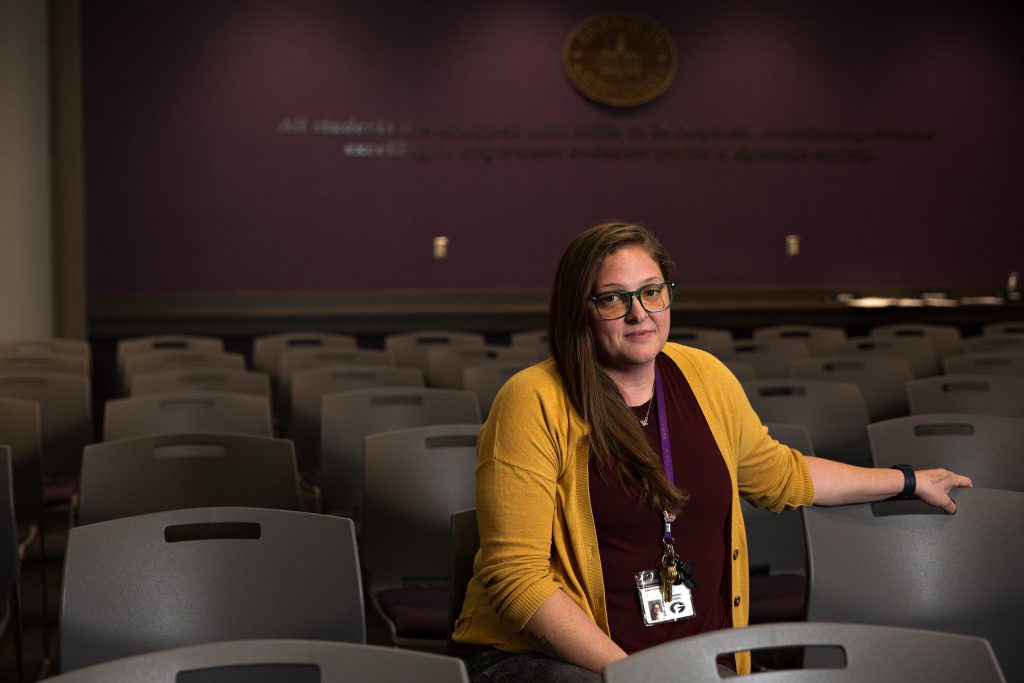
Reviewing 130 Books
In January, administrators in the Granbury school district summoned its librarians to a meeting to review library offerings “based upon the Governor’s criteria,” according to emails obtained by a Granbury parent through the Texas Public Information Act and shared with ProPublica and The Texas Tribune.
District officials immediately removed from the library shelves five books unrelated to LGBTQ themes by Abbi Glines, an author known for including explicit sex scenes that push the boundaries of young adult fiction. They also pulled about 130 other titles from school libraries, pending a review by a district committee composed of teachers, librarians and parents.
“Let’s not misrepresent things. We’re not taking Shakespeare or Hemingway off the shelves,” Glenn said at a school board meeting last week in which he blasted opponents of the book removal effort. “And we’re not going and grabbing every socially, culturally or religiously diverse book and pulling them. That’s absurd. And the people that are saying that are gaslighters, and it’s designed to incite division.”
Glenn made no mention of the dozens of LGBTQ-themed books that had been pulled from the shelves for further review. Of the 130 books temporarily removed, about 94, or 73%, feature LGBTQ characters or themes, according to a ProPublica and Tribune analysis of the popular book review site Goodreads.
Coyl said he is concerned that political candidates are increasingly using the issue of book censorship to win public office. “People need to be very vigilant and aware of it,” he said. “It’s a slippery slope. If we allow the restriction of one thing, it’s very easy to slide into more suppression.”
Experts say waves of backlash against LGBTQ communities often follow moments of cultural transformation. Schools have long been the battleground, dating at least to the 1970s, when anti-gay crusader Anita Bryant led a national movement to save children from gay adults.
But fed by social media, the same message today is spreading farther and faster than during past waves, experts said.
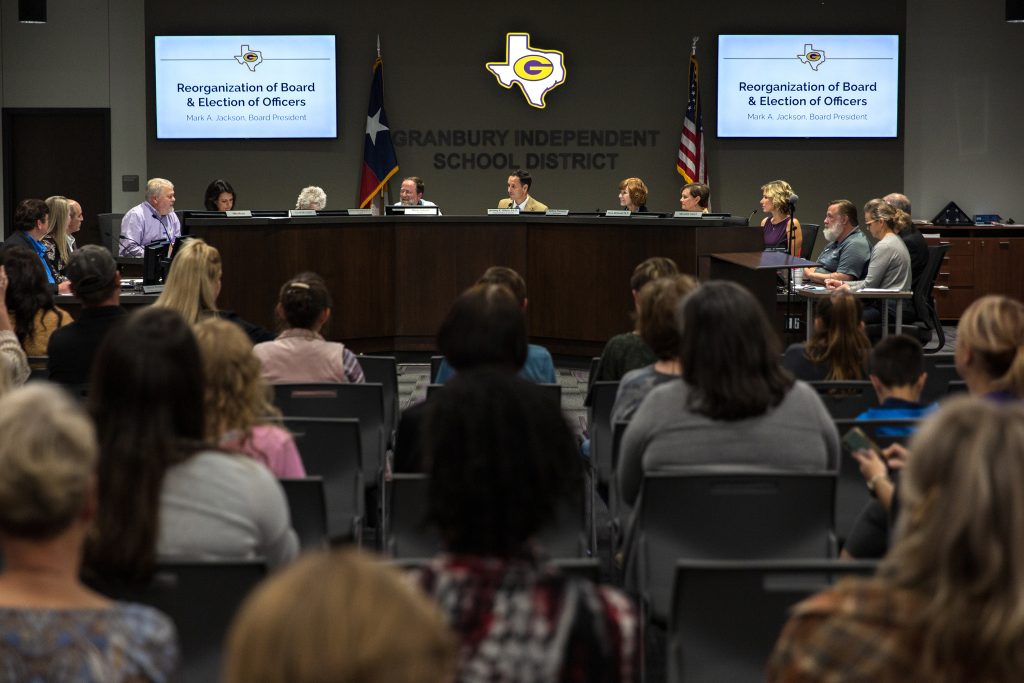
Vox Jo Hsu, an assistant professor of rhetoric and writing at the University of Texas at Austin who specializes in the effect of public rhetoric on racial, gender and sexual minorities, said movements to censor LGBTQ books can leave young people feeling alone.
“I can’t overstate the type of damage it does to create a culture of shame and silence around LGBTQ topics,” Hsu said. “You are teaching them, from a young age, these false narratives about who they are that they will have to unlearn and you’re depriving them of resources and communities they will need to do so.” Leaving a school district is not an option for all LGBTQ students or families, and children who are left behind when others depart will only become more isolated, Hsu said.
Last month, students in the Granbury district launched an online petition opposing the book removal effort. Within days, the petition had gathered more than 600 signatures. Students also spoke against the removal at last week’s school board meeting.
“I don’t think that little children should be shocked or disgusted by our identities,” a queer senior at Granbury High School said at the meeting, warning that removing the books would send a dangerous message. “It’s disgusting that, even in 2022, we still have to have these discussions about censorship.”
Glenn saluted the students for speaking out, but then took aim at those who questioned the removal of the books.
“During my tenure, I have witnessed radicals come into our boardroom and go onto social media platforms to distort the truth, exaggerate issues and bad-mouth our trustees,” Glenn said. “To those individuals, please know, like the little boys who cried wolf, you have lost all credibility to the majority in this community. We will not back down from you.”
In an email, Gore applauded the book removals and said the district is not taking aim at LGBTQ students or community members. “All students at GISD are loved and cared for by the amazing staff and administration,” she said. “With that, public schools are not the place for young people to express themselves sexually.”
Near the end of the discussion, Graft made a motion to amend the district’s policy on book removals, eliminating the requirement for campus-level committees that have determined whether concerns are merited.
The revised policy, which passed unanimously, will allow the district to remove books the administration and board deem “pervasively vulgar” or educationally unsuitable without going through the district’s existing process. Before the change, books had to stay on shelves until a review was completed.
“This is going to align the policy so that in the event that we do have a book that is in our library that is vulgar and overtly sexual, it can be removed without review,” said Tammy Clark, an assistant superintendent in the district.
Despite the policy change, district spokesperson Jeff Meador said a committee will review the books, and most of them “will likely be returned to the library shelves.”
Jonathan Friedman, the director of free expression and education at nonprofit PEN America, which promotes literary culture and defends freedom of speech, said the Supreme Court has not settled the constitutionality of removing school library books without a review. Still, he said it’s “highly concerning” that Hood County school board members “appear to have changed the policy just in order to appease the state lawmakers’ list of books.”
Friedman said that while there hasn’t been a recent legal challenge related to the spate of book removals, districts could find themselves in legal jeopardy if it becomes clear that their motive was based on “hostility towards the views in those books.”
Efforts to censor material usually fail, but the process can still be divisive and counterproductive, said Whitney Strub, a history professor at Rutgers University.
“I think history shows that these movements don’t actually succeed, but they do a lot of damage and inflict a lot of destruction and harm along the way,” Strub said. “And I absolutely think that’s likely to be the case at the local level.”

Seeking safety
The escalation of anti-LGBTQ rhetoric worries one Granbury mother of a 4-year-old, who asked that her name not be used as she fears retaliation because she is gay.
She recalled feeling reassured after county commissioners denied efforts to ban LGBTQ books from the local library in 2015 when she lived in a neighboring county. Although she didn’t have a child at the time, she believed that the books provided an opportunity to teach children that having gay parents is normal.
On election night in 2021, she was shocked when Graft, who had led the fight against the books, won. It was then that she and her wife decided to send their son, who is entering kindergarten, to another district. “It makes me worried that someone like her would tell kids that it’s not OK to be like that,” she said.
The woman can tick off the incidents of hate she has experienced since moving to the county four years ago: the stranger at the grocery store who called her a “faggot,” the senior citizen who threw his arms in the air in disgust and stormed off when he saw her kiss her fiancee goodbye.
She wanted school to be a safe space for her son, one that didn’t vilify him for having two moms.
“I wouldn’t put it past someone to physically harm me because I gave my fiancee a kiss,” she said. “Seeing stuff like the school board election definitely opens my eyes. Even though this is a small town, and I know most of the people, and I grew up next door, when it comes to sexuality nobody’s safe.”
Disclosure: The University of Houston and the University of Texas at Austin have been financial supporters of The Texas Tribune, a nonprofit, nonpartisan news organization that is funded in part by donations from members, foundations and corporate sponsors. Financial supporters play no role in the Tribune’s journalism. Find a complete list of them here.
The Texas Tribune is a nonpartisan, nonprofit media organization that informs Texans — and engages with them – about public policy, politics, government and statewide issues.
Education
Feds investigate another Texas school district for its gender identity mandate
Katy ISD’s board voted this past fall to require staff to notify parents if their child wants to use a different pronoun or identifies as a different gender.

This article originally appeared in The Texas Tribune
 The U.S. Department of Education’s Office for Civil Rights opened an investigation Monday into Katy Independent School District’s gender identity policy on the basis of gender harassment under Title IX. The investigation came nine months after the Houston Landing reported that the district adopted a policy that notifies parents if their child requests to use a different name or pronouns at school.
The U.S. Department of Education’s Office for Civil Rights opened an investigation Monday into Katy Independent School District’s gender identity policy on the basis of gender harassment under Title IX. The investigation came nine months after the Houston Landing reported that the district adopted a policy that notifies parents if their child requests to use a different name or pronouns at school.
Katy ISD did not respond to a request of how many parents have been notified this year under the new policy, which requires staff to inform parents that students are transgender or ask to use different names or pronouns.
The Houston Chronicle reported in December that the district had notified parents at least 23 times since the policy was adopted.
The gender identity policy also bars schools from teaching “gender fluidity” and denies students from competing in sports with the gender they identify with, which mirrors state legislation already regulating K-12 athletics.
Students Engaged in Advancing Texas, a student-led advocacy group, filed a complaint with the U.S. Department of Education in November regarding the policy. Katy ISD graduate and member of SEAT Cameron Samuels labels the investigation as a win against the conservative policies being passed in the district.
“Elected solely on platforms to target marginalized students, far-right school board candidates accomplished exactly what they were elected to do: weaponize identity and neglect students’ educational needs,” they said.
Title IX prohibits sex-based discrimination in educational settings or federally funded activities. Gov. Greg Abbott has loudly voiced his opposition to the federal law recently ordering the Texas Education Agency to disregard the Biden administration’s expansion of Title IX.
“The district is committed to offering equal educational opportunities to our entire community,” a spokesperson from Katy ISD told the Tribune in a response to the investigation. “While we have received the OCR filing and deny any wrongdoing, we are committed to remaining fully cooperative and responsive throughout the process.”
Victor Perez, Katy ISD board president and proponent of the policy, argued that the policy was “mischaracterized” by community members as an attack on its queer and transgender students and instead relieves the burden for staff withholding information from parents. The policy was passed at a board meeting in August with a vote of 4-3 after four hours of public comment.
Alastair Parker, a member of the Cinco Ranch High School Gender-Sexuality Alliance, spoke at the board meeting in opposition to the policy.
Parker and others argued that the policy infringes on the rights of transgender kids to express themselves and opens them to potential harm if they are outed to transphobic parents or caregivers.
Johnathan Gooch from Equality Texas, a nonprofit advocacy group for LGBTQ+ Texans, said he hopes students recognize their power to report policies like this in the wake of the increasing number of legislation targeting LGBTQ+ youth.
This isn’t the first instance in Texas of a gender related policy being investigated on the federal level. Carroll ISD in Tarrant County was reported to have eight open investigations last February after it eliminated protections over race, religion, gender and sexual orientation.
There are documented mental health benefits to using preferred pronouns. A research team at the University Texas at Austin conducted a study in which they concluded that students in gender-affirming environments report 71% fewer symptoms of severe depression, a 34% decrease in reported suicidal ideation and a 65% decrease in suicide attempts.
“When students place their trust in teachers and school administration, the school has a duty to preserve that trust,” Gooch said. “That duty requires schools to ensure that no disclosure would place a student in harm’s way.”
Parker has been out as a transgender man since the seventh grade and is supported by his father, who he resides with. He acknowledged that this isn’t the case for many of his classmates as some have parents that are less accepting.
His teachers have gone by his preferred name and pronouns for his entire high school experience. But since the policy has been enacted, he has seen some of his peers go by their deadnames fearing that their parents would be notified.
Over the past year, other schools across the state have adopted similar policies.
Keller ISD, which is also in Tarrant County, passed a policy in late June that prevents students from using their preferred name and pronouns or using restrooms with the gender they identify with.
The policy was met with retaliation from the Texas American Civil Liberties Union, writing in a letter to the district that the policy is “deeply invasive and unlawful for school administrators to interrogate students’ private medical information in this way.”
As the end of the school year nears, Parker observed the policy being enforced at varying levels of severity by teachers. The passing of legislation or policy like this deters from the ongoing health crisis for queer and transgender youth and is wholly unnecessary, he said.
“If a child’s not telling their parents something like that, it’s for a reason,” he said. “I know that most of the people who are in favor of this are the ones who bounce off whatever their parents have told them to repeat.”
Disclosure: Equality Texas has been a financial supporter of The Texas Tribune, a nonprofit, nonpartisan news organization that is funded in part by donations from members, foundations and corporate sponsors. Financial supporters play no role in the Tribune’s journalism. Find a complete list of them here.
The Texas Tribune is a nonpartisan, nonprofit media organization that informs Texans — and engages with them – about public policy, politics, government and statewide issues.
Amarillo
Appeals court considers whether West Texas A&M drag show was unconstitutionally banned
University President Walter Wendler canceled a drag performance last year, claiming such shows “denigrate and demean women.”
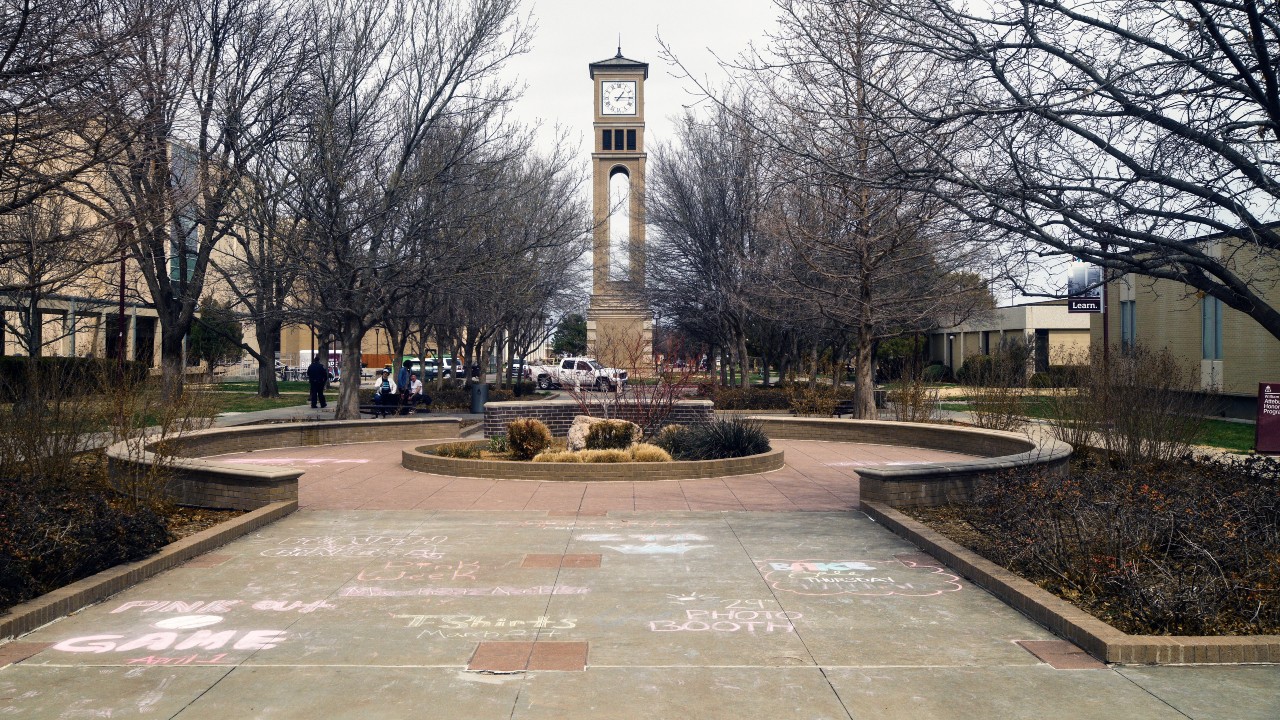
This article originally appeared in The Texas Tribune
 A federal appeals court considering whether West Texas A&M University’s president violated the First Amendment when he canceled a campus drag show last year focused many of their questions Monday on a U.S. Supreme Court ruling that upheld campus non-discrimination policies.
A federal appeals court considering whether West Texas A&M University’s president violated the First Amendment when he canceled a campus drag show last year focused many of their questions Monday on a U.S. Supreme Court ruling that upheld campus non-discrimination policies.
But the panel of three judges used that 2010 case — which said universities can require groups to admit LGBTQ+ students — to suggest that school officials could also ban drag shows because some people find the performances offensive to women.
A lawyer representing a group of West Texas A&M students who’ve twice attempted to host a drag show on campus argued before the 5th U.S. Circuit Court of Appeals Monday that President Walter Wendler discriminated based on viewpoint and censored speech when canceling the performances.
In March 2023, Wendler banned drag shows in response to a student fundraiser that featured drag performers. The president argued the performances “denigrate and demean women,” and shouldn’t be allowed on the public university’s campus.
In September, a federal judge said Wendler acted within his authority to cancel the drag show. In his opinion, U.S. District Judge Matthew Kacsmaryk wrote, at “this point in Free Speech jurisprudence, it is not clearly established that all ‘drag shows’ are categorically ‘expressive conduct.’”
Last month, students with WT Spectrum, the student group at the university, hoped to hold another drag show on campus — to show support for the LGBTQ+ community in a staunchly conservative corner of Texas.
With Wendler’s campus-wide ban still in place, the Supreme Court declined to intervene and the president again ordered the fundraiser from taking place.
The panel of judges hearing the appeal Monday were James Dennis, James Ho and Leslie Southwick.
Many of their questions centered around Christian Legal Society v. Martinez, a case in which the Supreme Court upheld a policy of the University of California, Hastings College of the Law, that bars student groups from excluding members based on status or beliefs.
In 2010, the Supreme Court affirmed that Hastings’ policy does not violate the First Amendment rights of CLS, a group of students that wanted to be officially recognized on campus while not allowing people who engage in “unrepentant homosexual conduct” from joining.
The 5th Circuit judges Monday seemed to suggest that Wendler’s ban was no different from the policy at the center of the 2010 Supreme Court case. One of the judges, who didn’t identify themselves before speaking, asked if plaintiffs intended to use the case in question to overturn CLS.
“Maybe we should overturn CLS?” one of three judges said. “Many people would like CLS overturned.”
Ho equated the policy upheld in CLS with Wendler’s drag ban. He said both intend to make everyone feel included, but the policies have the consequence of targeting one group. In CLS’ case, he said that Christians were singled out on Hastings’ campus for not allowing LGBTQ+ individuals to join. Ho said that previous groups on Hastings’ campus could exclude members, but CLS was singled out by the university’s non-discrimination policy.
JT Morris, senior attorney for the Foundation for Individual Rights and Expression who represented the students, argued that the judges were comparing “apples to oranges” between the two cases.
Morris argued CLS is about a content-neutral policy, while Wendler was clearly discriminating based on viewpoint.
“The First Amendment does not allow the government to use the subjective term ‘offensive’ to restrict speech,” Morris said.
Joseph N. Mazzara, a lawyer with the Texas Attorney General’s Office who represented Wendler, said the students had not suffered any injury as a result of the no-drag policy because there was no future event featuring drag performers planned. Additionally, Mazzara said Wendler’s policy carried no criminal penalties and students could host drag performances off campus.
Mazzara said Wendler’s ban was not a free speech violation, but rather it was akin to banning certain conduct, like skateboarding on the grounds of a monument. He said drag shows constituted conduct, not speech.
“They’re able to do everything they want to do, they’re able to say all the speech they want to [say],” Mazzara said, referring to the student group WT Spectrum. “They just can’t do this one particular thing in this one particular place.”
A judge asked Mazzara how the university would have treated drag shows put on by other student groups, such as a fraternity. The judges seemed to agree with Mazzara that Wendler’s restriction did not target a specific viewpoint.
“If a Christian legal group wanted to have a ‘Drag for Jesus’ event that would also be banned,” Mazzara said.
One judge suggested that some drag shows are offensive to the transgender community, and thus Wendler’s ban would equally protect that population from offensive performances.
Allison Marie Collins, another lawyer from the Attorney General’s Office representing other defendants named in the lawsuit, argued the appellate judges should not impose any restrictions on Texas A&M system Chancellor John Sharp or West Texas A&M Vice President for Student Affairs Christopher Thomas. She argued an injunction against Sharp or Thomas would be overbroad, because it’s clear that only Wendler has acted to stop these shows.
“Neither Chancellor Sharp nor Dr. Thomas have remotely engaged in viewpoint discrimination, exclusion from a public forum or a prior restraint complaint to speech,” Collins said.
In his rebuttal, Morris argued the plaintiffs have standing over Sharp because he has the authority over Wendler to put an end to this restriction on free speech.
“He has the authority to do what’s best for the campus,” Morris said of Sharp. “He should have put an end to this prior restraint, which shouldn’t have lasted a day, and has now lasted a year.”
Disclosure: Texas A&M University and West Texas A&M University have been financial supporters of The Texas Tribune, a nonprofit, nonpartisan news organization that is funded in part by donations from members, foundations and corporate sponsors. Financial supporters play no role in the Tribune’s journalism. Find a complete list of them here.
The Texas Tribune is a nonpartisan, nonprofit media organization that informs Texans — and engages with them – about public policy, politics, government and statewide issues.
Education
Under Katy ISD gender policy, student identities disclosed to parents 19 times since August
Public records obtained by the Houston Landing offer the first glimpse at how often the new, hotly contested policy has been used to disclose LGBTQ+ students’ identities to parents — even if the students aren’t ready.
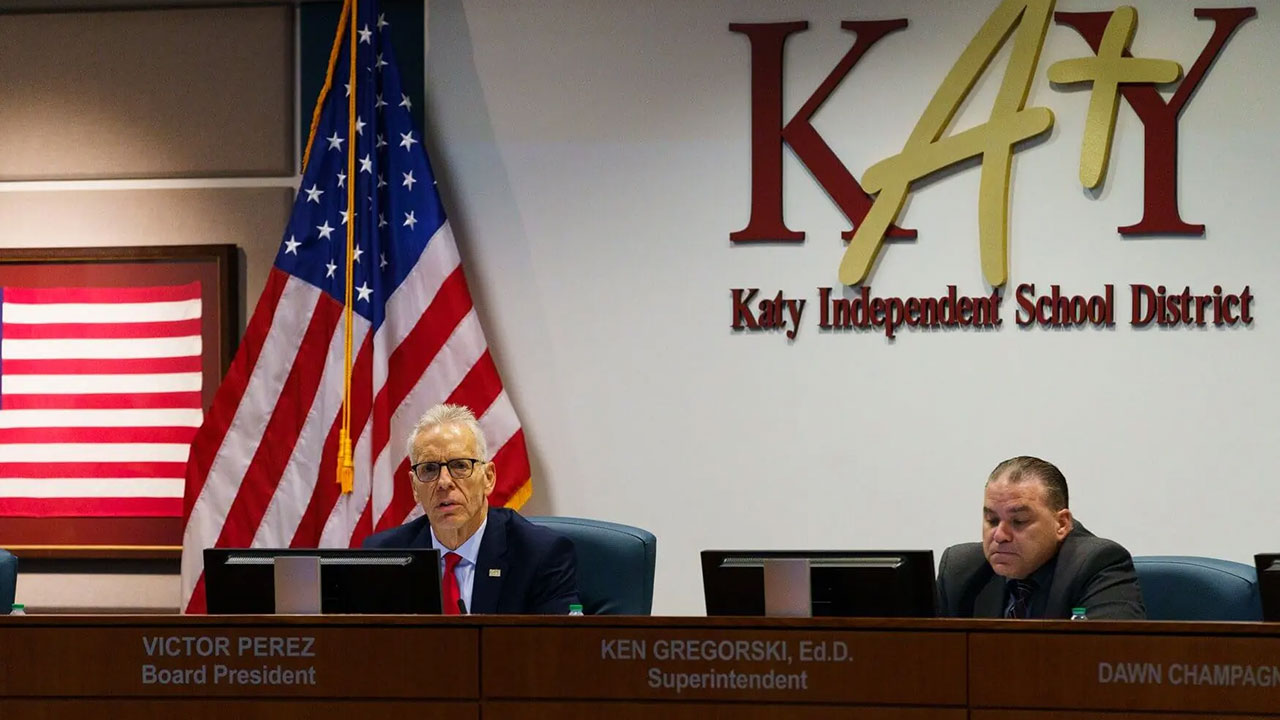
 Since narrowly passing a controversial gender policy two months ago, Katy Independent School District has sent 19 notifications informing parents that their child identified themselves as transgender or requested to use different names or pronouns at school.
Since narrowly passing a controversial gender policy two months ago, Katy Independent School District has sent 19 notifications informing parents that their child identified themselves as transgender or requested to use different names or pronouns at school.
The number of parental notifications, obtained by the Houston Landing through a public records request, is the first glimpse at how often the new, hotly contested policy has been used to disclose LGBTQ+ students’ identities to parents — even if the students aren’t ready.
So far, the district averages a notification to a parent roughly once every three days.
The district’s policy requires staff to inform parents if their student requests to use different pronouns or names, or if they identify themselves as transgender — and obtain written parental consent to comply with the request. It also prohibits employees from asking for students’ preferred pronouns and discussing “gender fluidity,” and requires students to use bathrooms that align with their sex assigned at birth.
Jarred Burton, a student leader at Tompkins High School’s Sexuality and Gender Alliance, said the number of notifications already sent to parents is both depressing and surprising. Critics, including Katy parents, LGBTQ+ students and local advocates, have blasted the policy as a dangerous measure with the potential to expose students’ gender identities to unsupportive parents, further harming a community that already faces a higher risk of mental health issues than their peers.
“It’s just sad to see this actually happening,” Burton said. “It shows that (the policy) is not a bluff.”
Board members who supported the policy hailed it as a measure that would center parents’ right to be informed about their child’s gender identity and protect teachers from making uncomfortable decisions about concealing such information from parents.
“(Parents are) supposed to be looking after the health and welfare of their child,” Board President Victor Perez said at a late August meeting. “Withholding that information from the parent, that is a great burden on staff.”
It’s unclear how many parents were already aware of their child’s gender identity. District officials also did not make any board members available for an interview on the matter.
“The policy is intended to provide parents and guardians the opportunity to be made aware of their child’s name change request, and the opportunity to grant or deny approval of said request,” Katy spokesperson Nick Petito said in a statement Wednesday.

Ash Thornton, a transgender man and a junior at Tompkins High School, said the number of notifications being sent home will discourage LGBTQ+ students from feeling safe to explore their identities.
“It signals that it’s something bad, them being transgender or expressing gender in a way that’s different,” Thornton said. “It definitely messes up student-teacher relationships.”
Employees are not required to comply with a student’s name or pronoun change even if a parent gives consent, the policy states.
One staff member on every campus is responsible for processing and sending notifications to parents and guardians, Petito said. The policy makes an exception for “cases of suspected abuse.”
Students belonging to LGBTQ+ clubs have told the Landing the policy has caused their schools to become less of a safe space and has instilled fear among LGBTQ+ youth in Katy.
“There’s just been this looming cloud of dread over a lot of people,” Burton said in a September interview. “There’s gonna be a lot of people that get in trouble by their parents or get hurt. … It just sometimes keeps me up at night a little bit because it’s hard to imagine how much hate people can have to pass something like this.”
The number of notifications sent to parents to date leaves Thornton to wonder what else is to come.
“It’s only been two months and there’s already 19, how many more people are going to be affected by even just the end of the semester?” he said.
The Houston Landing is a nonprofit newsroom devoted to public service journalism for all Houstonians.
This article first appeared on the Houston Landing and is republished here with permission.







